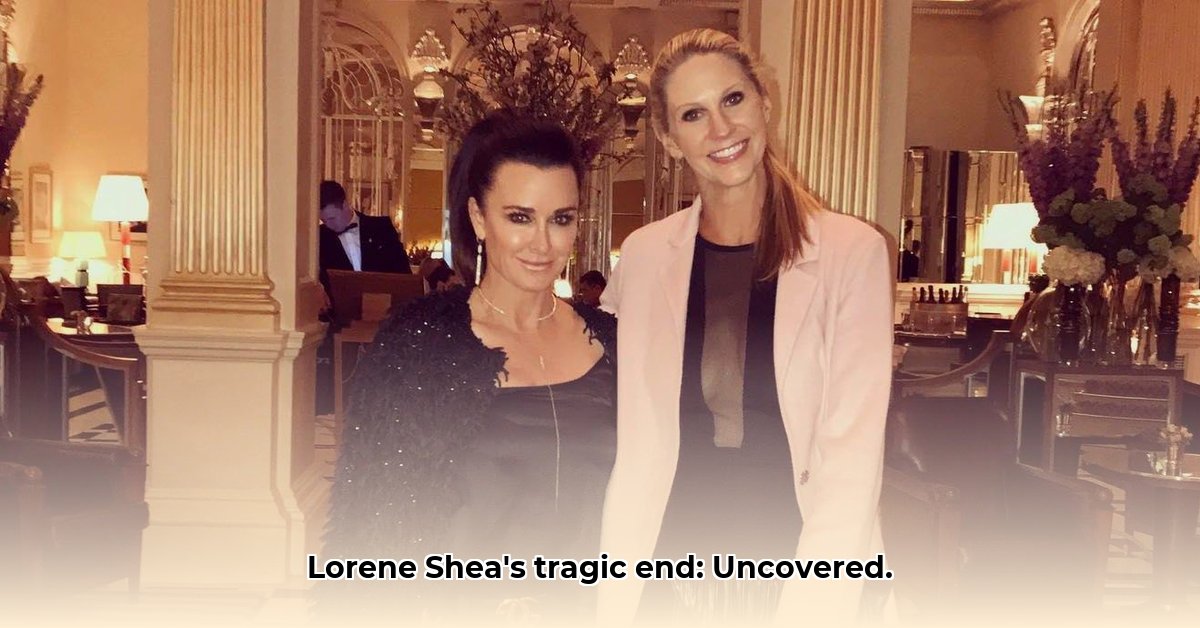
Lorene Shea: A Life Cut Short, A System Failing
The recent passing of Lorene Shea, a friend of reality TV personality Kyle Richards, has sparked conversations beyond the realm of celebrity circles. While speculation surrounding Lorene Shea's net worth might be tempting, her story is far more significant—a poignant testament to the urgent need for comprehensive mental healthcare reform. Her death tragically highlights systemic failures that leave countless individuals struggling to access the care they desperately need. This article will delve into the challenges Lorene faced, reveal the cracks in our mental healthcare system, and outline concrete steps toward a brighter future.
A Life Interrupted: Lorene's Story and the Struggle for Care
Lorene Shea, a dedicated professional who dedicated her life to working for the US Forest Service, privately battled severe depression. Her story isn't unique; it's a reflection of the countless individuals who silently endure mental health struggles, often facing formidable barriers to accessing adequate care. Lorene's experience underscores the devastating consequences of a system that frequently fails to provide timely and effective support, leaving individuals and their loved ones to grapple with unimaginable pain. How many others are suffering in silence, their stories mirroring Lorene's tragic experience?
The System's Deep-Seated Flaws: Why Mental Healthcare Fails
The current mental healthcare system suffers from a multitude of interconnected problems. These failures are not simply isolated incidents; they are systemic, deeply rooted in insufficient funding, limited access, and a pervasive societal stigma.
- Accessibility Crisis: Many communities desperately lack sufficient mental health professionals, leading to extensive wait times, delayed treatment, and ultimately, preventable harm. This shortage disproportionately impacts underserved populations.
- Financial Barriers: The cost of mental healthcare remains prohibitively expensive for many, even with insurance. High co-pays, deductibles, and the complexities of insurance navigation create significant hurdles, forcing many to forgo essential treatment.
- The Stigma of Silence: Deep-seated stigma continues to discourage many from seeking help, perpetuating a cycle of suffering and isolation. The fear of judgment, discrimination, and social repercussions keeps individuals from accessing crucial support.
These systemic challenges don't just affect individual patients; they impact entire families and communities. The emotional toll on loved ones, such as Kyle Richards, is immense and often overlooked.
Bridging the Gap: A Call to Action for Systemic Change
Addressing this critical issue demands a coordinated and multifaceted effort involving individuals, healthcare providers, governmental agencies, and insurance companies. We must work collaboratively to transform our mental healthcare system into one that is truly equitable, accessible, and effective.
Here are actionable steps toward meaningful change:
- Increase Funding and Resources: Governments must significantly increase funding for community mental health centers, expanding access to services and reducing wait times. This includes investing in telehealth infrastructure to expand reach to remote and underserved areas.
- Strengthen Mental Health Parity Laws: Ensure consistent enforcement of existing parity laws to guarantee equitable insurance coverage for mental and physical healthcare. This requires eliminating loopholes and clarifying ambiguities in policy.
- Expand Access to Affordable Care: Implement programs to make mental healthcare more affordable. This includes increasing support for low-income individuals and reducing out-of-pocket costs.
- Improve Provider Training and Recruitment: Invest in training programs and offer incentives to attract and retain mental health professionals, particularly in underserved communities.
- Challenge the Stigma: Launch widespread public awareness campaigns to address the stigma surrounding mental illness and promote help-seeking behavior. This requires fostering open conversations and creating a culture of understanding and support.
A Legacy of Change: Beyond Lorene Shea's Net Worth
Lorene Shea's story transcends the discussion of net worth. It serves as a stark reminder of a critical societal issue and a powerful call to action. Her legacy should not be defined by her financial status but by the lasting impact we make in improving the mental healthcare system. Her memory should inspire us to build a more compassionate, accessible, and effective system for those who are suffering in silence. Only then can we prevent future tragedies and ensure that the invaluable lives of individuals struggling with mental illness are given the respect, support, and treatment they deserve.